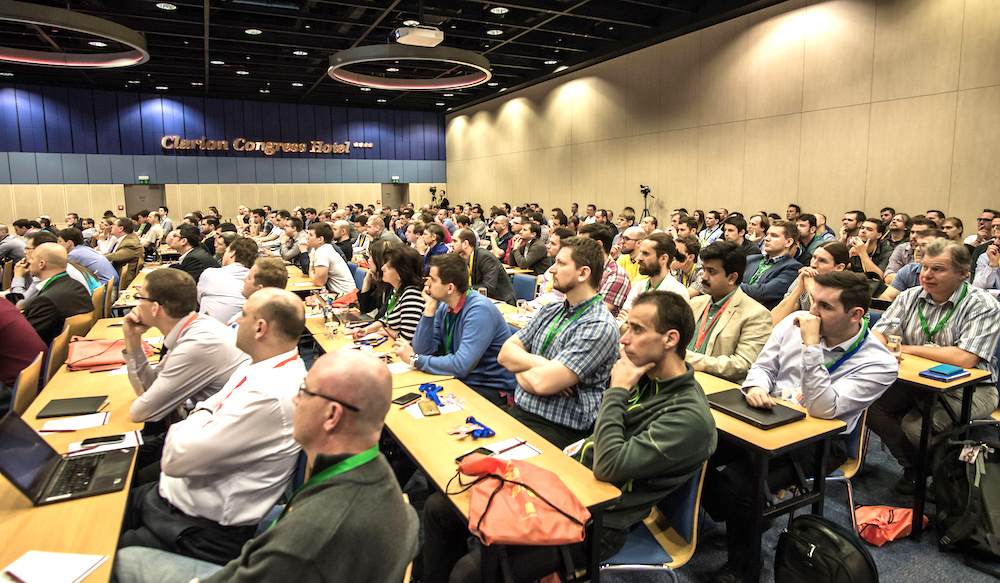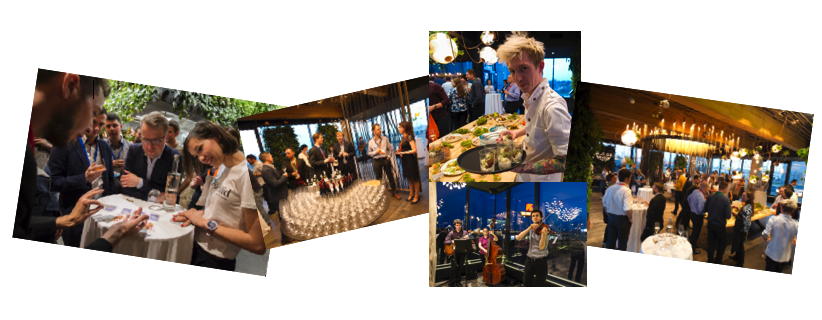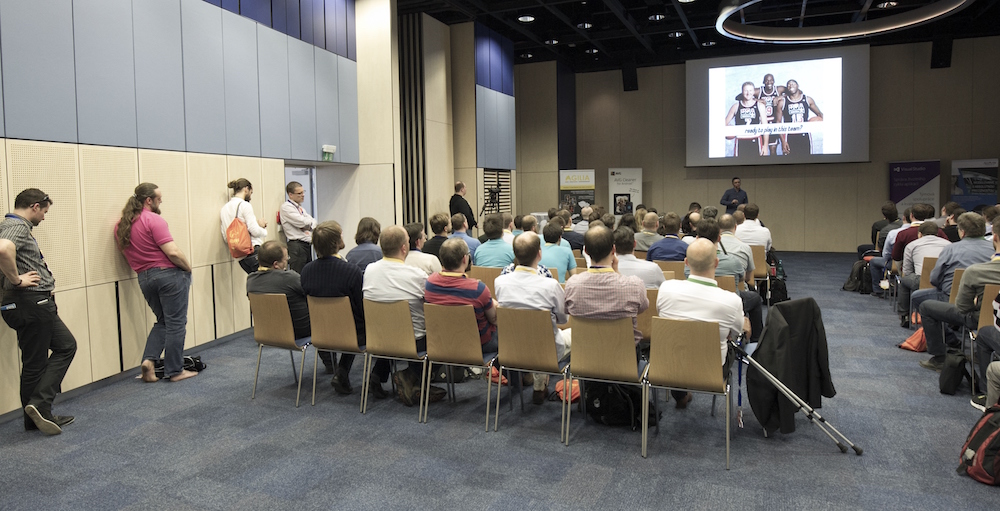20. July 2017 / Michal Vallo
Some time ago I came across an interesting article of Yegor Bugayenko, who present his opinion on mistakes, which conference organizers keep making. Full article you can find here. I would like to add perspective of conference organizer on mentioned mistakes and beyond, and occasionally have to disagree with Yegor. Being in conference organizing for about 8 years, I consider Yegor’s opinions quite selfish and extreme. It pretends the perspective that entire conference is about well-being and interests of speaker only. In my experience I saw many times, that speakers, who were engaged and participative delivered way too better value for audience, and in return for themselves, than selfish ones. In my comments to these 11 sins I will use examples from our Agilia Conference – an event that presents Agile techniques to advanced audience.
Adding to the picture, when organizing conference, there are more types of stakeholders involved in the event, not just speakers. And they all have their own interests or agenda. And organizer is the one, who tries to co-ordinate all these interests into single outcome. It is more complex, when we realize, that organizer is one of stakeholders, and he has its own agenda and ambition why he organizes event.

Agilia Conference, Olomouc, Czech Republic (size 400)
Too formal (communication)
Selection process brings need to proceed many proposals and communicate with great number of people. It is time consuming process and naturally comes desire for automation if economy must be kept on reasonable level. Where automation is not an option, organizers tries to invite again and again same speakers to limit diversity in communication. It results in club of friends, who goes to speak to the same event year after year often when they have nothing to say. Or organizers invite 2-3 somehow significant keynotes, and rest are just fillings, whoever subscribes first. It is nothing, that should make delegates happy. Formality secures that nothing will get lost in the process. User friendliness depends on experience and resources organizers have.
In Agilia Conference our approach is around delegates. In the end, they pay for the show. We aim at top end event, so every single year we try to provide fresh content. We have discovered, that there is very limited number of quality presenters available. We have to dig deeper, which results in increase in communication. Every year we process some 250-300 proposals, often many pages of dense text, occasionally books. Some cases require face-to-face meeting and travel to remote location to see it in real. Ratio is some 50/50 people who applied via CFP and who were contacted by us. Selected are around 30. It is not easy to keep communication link with 200 people in parallel. Many are unable to respond fast, have to be reminded repeatedly. Without automated tools it is a nightmare.
Short breaks
Longer breaks are indeed good ones, however also event set up must support engagement.
In my observation speakers do very little to encourage discussion after the presentation. We have longer breaks and room set-up, still it is not easy to encourage deeper discussions where controversial opinions may be provoked. I would like to see such discussions to result in a storm of articles arguing one with another. Speakers often run away, to some hidden place to read their emails or tweet about themselves ignoring delegates who came to interact with them.
Moderator
Yes, fully agree that it is a good to have one. Role of moderator is even bigger. He is there to support speaker and helping him to provide maximal performance. Speaker indeed must feel that there is somebody on his behalf who is ready to help if anything happen.
Boring website
Good conference could have nice web site. The question is, how people use it afterwards and whether investment into such website returns. I have visited some great events, and they have had very “spartan” websites. Organizers mostly struggle with resources, and design even decent website today is indeed expensive. They have to judge and decide where to invest.
Cheap venue
Underlying economy dictates its limitations. However, in small countries it is challenge to find suitable place for an event. It is common that there are two or three suitable buildings in the whole country for size or type of the event. And they often do not need to be in proximity of transportation or airport in case of international events. Since conference does not scale, some organizers are just forced to compromises. Financial aspect is different story, because cheap looking event not necessarily was financially cheap. Sometimes building is good, but support services of the owner are low and can’t be improved. I believe, venue should be adequate to the event. However, it often surprises me when we are approached by delegates asking for low end venue or garage or just do not know to behave adequately to the event they are at.

Agilia Conference Great (Cheap) Networking Event, Olomouc, Czech Republic – is indeed cheap venue.
No introduction
I am not with Yegor here. Exactly opposite. It is role of the speaker to be already known to the extent his work or name will attract at least some delegates to attend the event. Delegates comes to see speakers, not organizers. Sure, most organizers promo speakers through their channels. In my experience, it is often challenging to obtain from speaker’s materials for advertisement. Just such an ordinary thing like a picture is an issue. Speaker should have its portfolio of pictures by pro photographer – in time! Most speakers need constant urgencies often over extended period of time, and materials are collected only shortly before event. Then most communication channels are already closed, they have limited throughput. Many speakers do not promo on their blog or their channels they go to attend the event not do not share communication created by organizer.
With promo there are also another two problems.
First. Some speakers subscribe to as many conferences as they are able to discover and if selected, they travel in a row. This makes problem with inflation of their brand for an event. Why to travel to visit event abroad to meet particular speaker if he will be available here around? This puts into great disadvantages events organized in the small countries. Cross border audience is important for survival or for quality of the event.
Second. In spite of agreement on form and content, it is not exactly unusual that speakers comes with different content. And it does not correspond to what was promoted. In such cases it is organizer who has to explain to angry delegates why he did not announce program change. It may and often has also negative consequences for organizer, be it on reputation or financial, but rarely for speaker himself.
Slow wifi
Common. Are you coming to conference to learn and share ideas or retrieving your emails? Sadly, in my observation it is common that speakers dedicate to their email agenda and ignores delegates or other speaker’s performance. Situation get worst, when two speakers friends haven’t seen each other for long time and separate themselves from the event. How can networking work then?
No networking
Many people do not know what is networking about. Therefor also etiquette for networking is often ignored. On the other side I as organizer expect speakers know what is right behavior and take care of themselves. We as an organizers can provide opportunities and arrangements, which encourage networking, but we are not kinder garden managers. At Agilia Conference we have 2 evening activities particularly designed to intensive networking, informal and also business. Along other opportunities during event. But speakers must attend them and actively engage. Travel arrangements are also a factor here.

Hi Yegor, I brought you great networking opportunity. Ooops, jetlag is a killer!
No Video
If speaker capture video of his speech at mobile phone and upload it on the Youtube, indeed, there is a chance there will be more views than number of delegates in the room. But is this a measure of success? I consider this behavior extremely selfish and offending to event organizer. I do not agree that greater video view position speaker above the event, such opinion is totally wrong. I wander why speakers subscribes to speaking at the conference, if they can achieve with its video channel “much more”. It is even cheaper.
In my observation over years, capturing video is very expensive. Especially, if I aim at quality recording TED style, not a mobile phone or small camera placed somewhere. Once we have archive, it mostly helps promoting speakers further. Our data shows, that it has little or no effect on supporting event itself. In the same time we register increasingly feedback from delegates that they decline visit of the event when videos of speeches are freely available on internet. It is hard to decide how to proceed with this. Some events do not provide videos at all. Some only keynotes. Some tries all. And we are trying experiment with paid channel.
Bad equipment
True, many events have poor audio equipment. It falls onto organizers. And those are only intermediary. We have had problems with audio at our events, sometimes more visible than other times. Audio equipment provides owner of infrastructure. It is like this – “here it is, turn it on like this, turn it off like this”. And then no support during event at all, even if specifically requested. No batteries in microphones, no backup, various devices with incompatible technical parameters. You can complain. And all you get is standard response with surprise in the voice: “you are first who complained, it was always working”.
Facility providers charge for audio services quite high price. To prevent situations like above we tried in one case to test equipment day ahead. Once all was working fine, we locked the server room and considered all is ok. Next day in the very morning came technician, reset configuration and went home, because we specifically requested they will not touch equipment during the event. So when error was discovered, there was nobody to call for help. Solution is having own crew for audio, but it is serious economic issue then. In hotels also technicians are not sound masters, they do not understand how their audio equipment works. Sometimes it is managed centrally from another town, which means you have to “create ticket”.
Size of the event – small, big or many tracks
Optimal size of the event depends on purpose. Organizing festivals will be different from professional event. Festivals – 1000+ people, have often good profitability and there is possibility to make many perks. With downside of lack of learning and networking. For specialized events, audience will be often small, something like 100, regardless of will of the organizers. Simply there is not more people in a region interested in the domain. And sometimes there is possible to do something in between. With size of around 400 comes troubles of bringing people in – may mean all people in a given domain have to come. And there will be insufficient infrastructure issue. Simply there are limited number of venues for medium sized events. Organizing event in London or New York is different story than at any other location.

Agilia Conference, Olomouc, Czech Republic – side track 180
With 400 people there is high probability not all will be interested in particular presentation, and multiple track are an option. We as organizers do not know in advance, which speaker will attract how much attention, so it may happen room will be crowded a bit more than expected. When preparing program, we try to arrange speakers into slots the way no speaker would feel disadvantaged by “competing” against somebody of different league. Speaking shouldn’t be about competition, as parallel talks are addressing different topics.
PS: For those not familiar with my occasional sarcasm, Yegor is a great guy and great speaker with controversial topics, who can get you thinking your status quo.
About author: Michal Vallo helps managers to understand agile techniques, benefit from its adoption to their organizations and consequently radically improve organizational overall performance. He is principal, agile trainer, coach and manager at Aguarra, founding member of Agilia community and organizer of Agilia Conference / Agile Management Congress in Olomouc and Agilia Budapest conference.